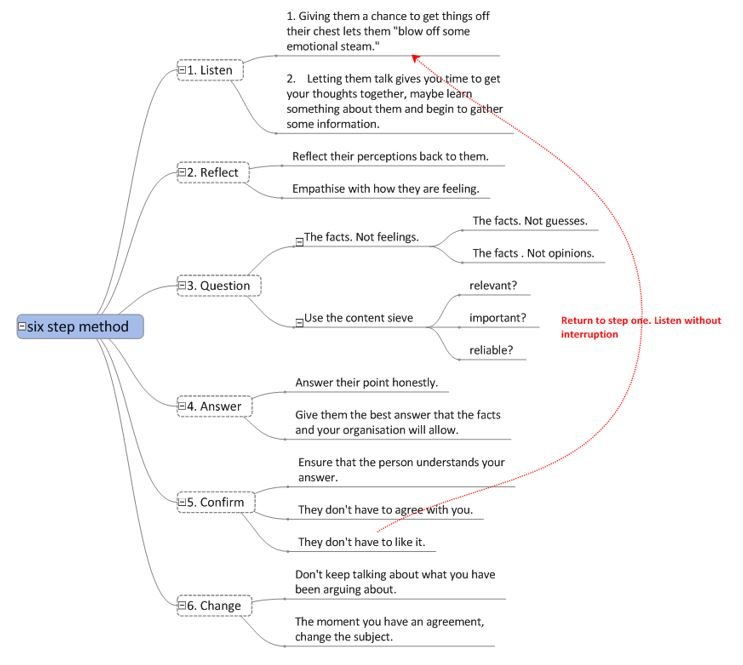Grievances At Work
Grievances in the Workplace
Grievances at work can be time consuming.
There are two approaches that may be used to handle grievances in the workplace.
- Prevent grievances from happening, by eliminating their causes.
- When grievances do occur, handle them effectively.
Let us look at the two approaches and build two methods.
Prevention is better than cure.
Grievances are usually caused by one of four things.
- What someone did.
- What someone failed to do, or
- What someone said.
- What someone failed to say.
If you can improve the quality of the performance, and especially the language, of the key members of your management and leadership team, then the incidents of grievances will be reduced.
If there are certain people whose behaviour or language tends to generate problems, then you may want to train them.
Train them on personal effectiveness skills and ask them to stop doing the things that cause the problems, (which is often the way they communicate to colleagues).
If you want to prevent the grievances, then send your managers on our two-day leadership programme.
What if you cannot prevent it and you have an existing grievance?
Six-Step Method to Handling Grievances
These six steps will help you handle grievances effectively:
- Listen without interruption.
- Empathise (without implying agreement).
- Question to get the facts (apart from the feelings).
- Answer: Logically evaluate the facts and formulate your answer.
- Confirm: Ensure they understand your answer.
- Close the conversation or change the subject, when understanding has been reached.

Summary: How to handle grievances in the workplace
If you want to learn more about how to effectively handle grievances at work, please take a look are our Conflict Management training course.
It is worth memorising this list and remember the method, next time you need to handle a grievance.
- Listen.
- Reflect.
- Question.
- Answer.
- Confirm.
- Close.
Definition: workplace grievance
Context: Business | Genus: complaint | Differentia: 1. Raised by an employee about a work matter; 2. Claims harm or unfairness caused by an action, inaction, words or omissions at work; 3. Submitted through the employer’s set procedure; 4. Seeks a clear reply and practical remedy.
Show CG4D Definition
- Raised by an employee about a work matter
- Claims harm or unfairness caused by an action, inaction, words or omissions at work
- Submitted through the employer’s set procedure
- Seeks a clear reply and practical remedy
Article Summary
Grievances at work waste time and money, yet most vanish when leaders speak clearly, act fairly and follow a simple six-step plan: listen, show care, ask, answer, confirm and close.
Frequently Asked Questions
Here are some questions that frequently get asked about this topic during our training sessions.
What four actions often trigger a grievance at work?
Why does the article say prevention beats cure for workplace disputes?
How can a manager prevent workplace grievance before it starts?
What is the six-step grievance method in brief?
Why must you listen without interrupting during a grievance?
How do you empathise without agreeing with the complaint?
When should you close or move on from the grievance talk?
Thought of something that's not been answered?
Did You Know: Key Statistics
Acas research (2021) finds workplace conflict costs UK employers £28.5 billion a year, or about £1,000 for every employee. CIPD Good Work Index 2024 reports that 25% of UK workers experienced a workplace dispute or conflict in the previous 12 months.Blogs by Email
Do you want to receive an email whenever we post a new blog? The blogs contain article 5-10 minutes long - ideal for reading during your coffee break!
Further Reading in Conflict Management and Handling Difficult People
-
How to Deal With Difficult Employees
Learn how to handle difficult employees through a fair six-step plan that names behaviour, seeks commitment, and cuts workplace conflict and lifts results.
Read Article > -
Is the Karpman Drama Triangle Good for Resolving Conflicts?
Discover why the Karpman Drama Triangle fails and how a clear, rational, positive approach creates faster, fairer conflict management that benefits every side.
Read Article > -
Fixing Bad Relationships at Work
Struggling with conflict? Fixing workplace relationships needs clarity, rationality and positivity. Use calm language, drop verbal anger and rebuild trust.
Read Article > -
How to handle workplace conflict
Learn how to handle workplace conflict with calm talk, exact facts and positive action. Follow clear steps to avoid misunderstandings and resolve issues fast.
Read Article > -
Dealing With Difficult Behaviour at Work
Learn ten clear steps to handle difficult behaviour at work, defuse emotion, find facts and agree future-focused solutions that lift team performance.
Read Article >
Looking for Conflict Management Training?
If you're looking to develop your Conflict Management and Handling Difficult People Skills, you may find this Conflict Management Training Course beneficial:
Open Training Course Pricing and Availability
Next Open Course Starts in 8 days, Manchester City, places available







